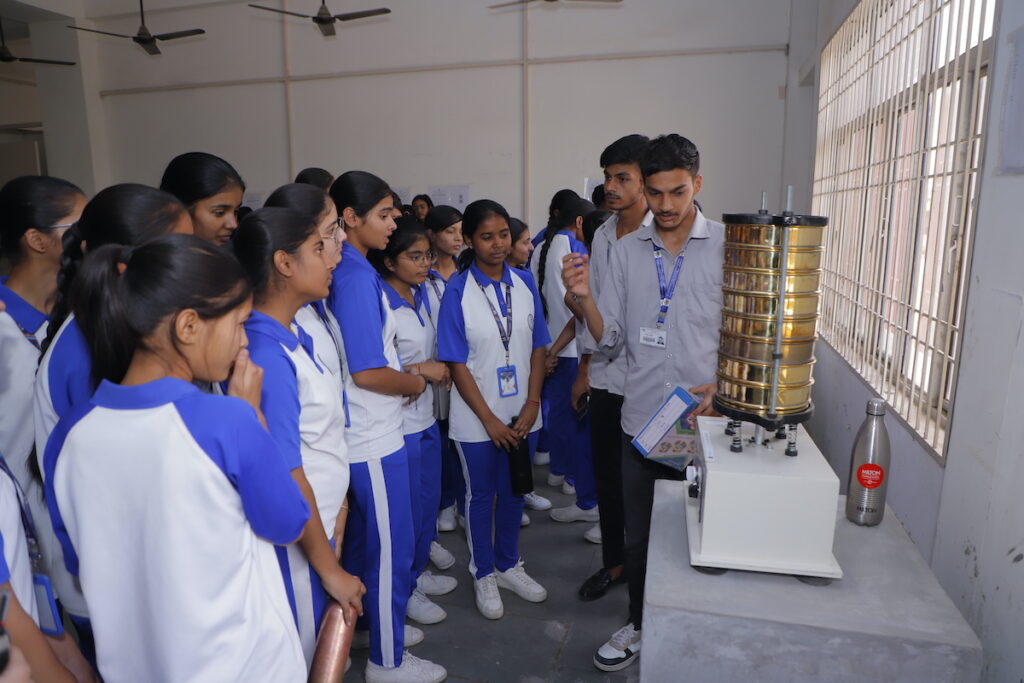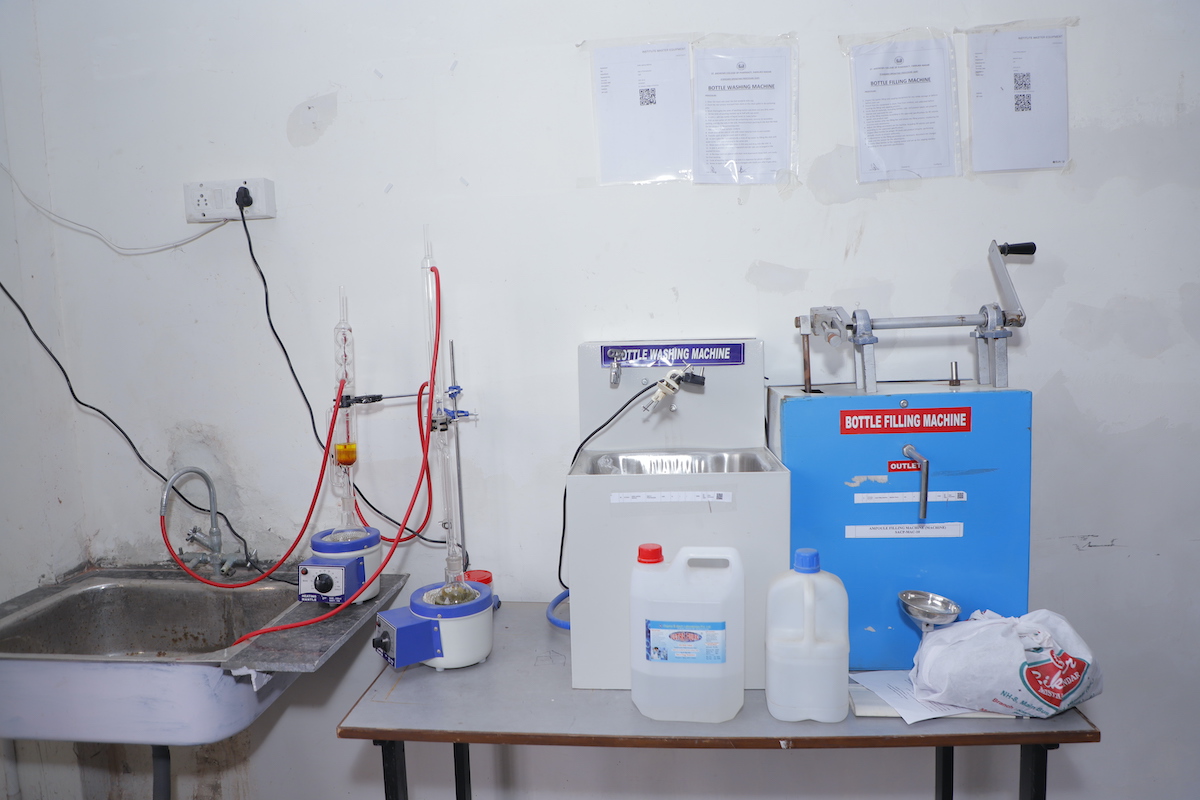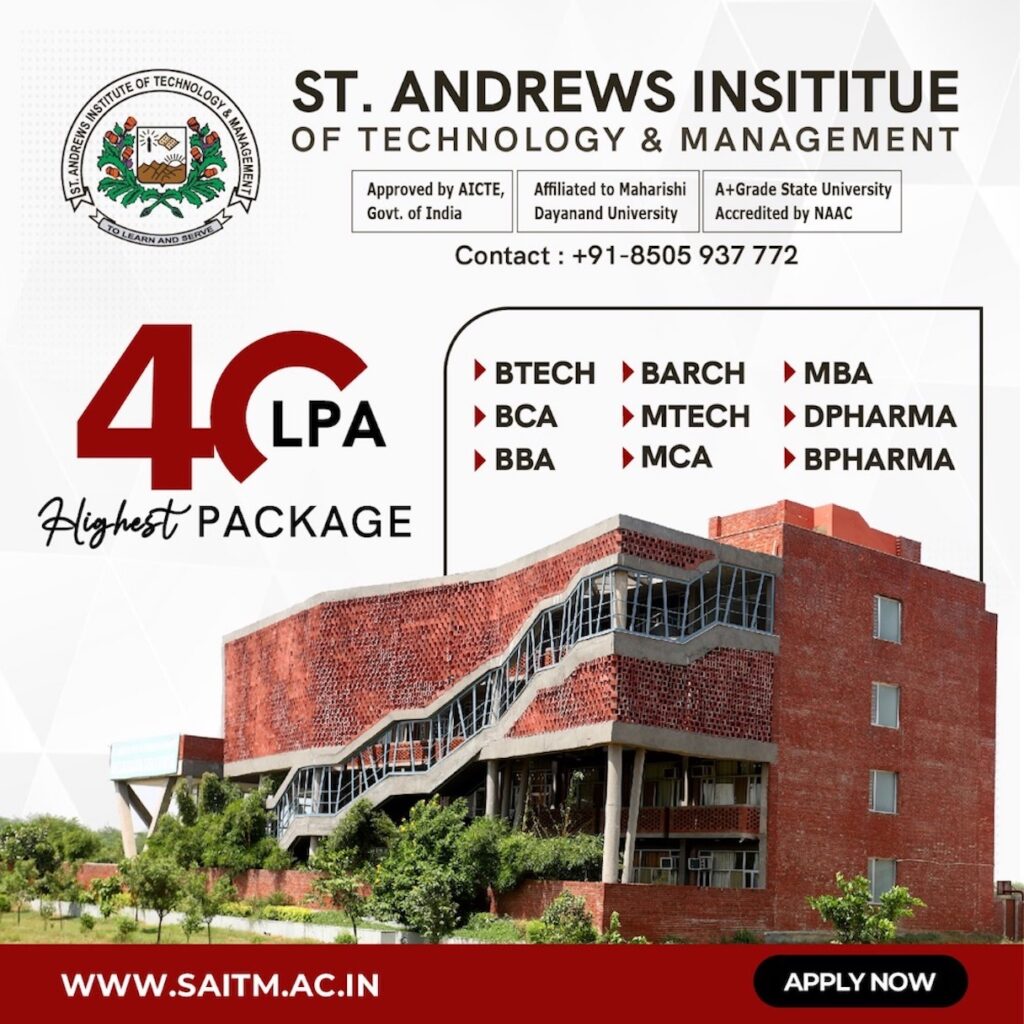D Pharma 1st Year Syllabus
The D Pharma 1st Year Syllabus is structured to lay the groundwork for essential pharmaceutical knowledge. It includes key subjects like Pharmaceutics, covering the fundamentals of medicine formulation and preparation.
Pharmaceutical Chemistry, which covers the chemical and biochemical properties of drugs, is another crucial component, providing insights into drug design and molecular interactions. Human Anatomy and Physiology are studied to understand the biological systems that drugs target.
Additionally, subjects like Biochemistry and Pathophysiology are included to give students a comprehensive understanding of the biochemical changes and pathological states that can affect human health.
This year also usually involves practical laboratory work, allowing students to apply theoretical knowledge and gain hands-on experience in drug preparation and analysis.
Some of the most opted courses in India and St. Andrews college or different Engineering college or Management colleges are as follows:-
- Btech
- Btech CSE
- Btech ETCE
- MTech
- BCA
- BBA
- MBA
- MCA
- DPharma – St. Andrews College of Pharmacy
- BPharma – St. Andrews College of Pharmacy
- BArch – St. Andrews College of Architecture
Overview of D Pharma Course

The Diploma in Pharmacy (D Pharma) is a 2-year course designed to prepare learners for careers in the pharmacy industry. It covers essential subjects like Pharmaceutics, Pharmaceutical Chemistry, Pharmacognosy, Biochemistry, and Laboratory Medication, along with Human Body Structure and Physiology.
The D Pharma 1st Year Syllabus combines theoretical learning and practical lab sessions, preparing students for roles in drug formulation, dispensing, and patient counseling. Graduates can become pharmacists, work in drug stores, or continue their education in pharmacy, setting a robust foundation for a healthcare career.
D Pharma Course Duration

The D. Pharma (Diploma in Pharmacy) course typically spans 2 years. It is divided into four semesters, each covering core subjects such as Pharmaceutics, Pharmaceutical Chemistry, Pharmacognosy, Biochemistry, and Laboratory medicine.
The curriculum includes both theoretical studies and practical training, which prepares students for various roles in the pharmacy industry and healthcare settings.
Additionally, students undertake internships or practical training in pharmacies or hospitals to gain hands-on experience. The course is designed to equip graduates with essential knowledge and skills for careers in pharmacy practice, drug management, and patient care.
D Pharmacy Syllabus: Year Wise

Here is the overview of D Pharma syllabus year wise:
First Year
Pharmaceutics I – Focuses on the formulation of drugs, preparation of various dosage forms, and the principles of dispensing, making it a foundational pharmacy subjects.
Pharmaceutical Chemistry I – Covers the chemical properties and composition of drugs, providing a foundation in pharmacy sciences.
Pharmacognosy – Studies medicinal plants and natural sources of drugs.
Biochemistry and Clinical Pathology – Explores biochemical processes and clinical lab techniques.
Human Body Structure and Physiology – Provides knowledge of the human body’s structure and functions.
Health Education and Community Pharmacy – Discusses public health, hygiene, and disease prevention.
Second Year
Pharmaceutics II – Advances in drug formulation and technology.
Pharmaceutical Chemistry II – Further studies in medicinal chemistry and drug design.
Pharmacology and Toxicology – The effects and side effects of drugs on the human body.
Pharmaceutical Jurisprudence – Covers laws and ethics in the pharmaceutical industry.
Pharmacy and Business Management – Focuses on managing a pharmacy business.
Hospital Pharmacy – Deals with pharmacy practice in a hospital setting.
D Pharma Syllabus: Semester Wise

Semester 1
- Pharmaceutics I: Dosage forms, pharmaceutical calculations.
- Pharmaceutical Chemistry I: Inorganic chemistry, quality assurance.
- Pharmacognosy: Medicinal plants, natural drugs.
- Biochemistry & Clinical Pathology: Basic biochemistry, clinical tests.
- Human Body Structure & Physiology: Body structure and function.
Semester 2
- Pharmaceutics II: Advanced dosage forms, dispensing.
- Pharmaceutical Chemistry II: Organic chemistry, drug synthesis.
- Pharmacology & Toxicology: Drug actions, side effects.
- Pharmaceutical Jurisprudence: Pharmacy laws and regulations.
- Health Education & Community Pharmacy: Health promotion, community practices.
Semester 3
- Pharmaceutics III: Specialized formulations.
- Pharmaceutical Chemistry III: Medicinal chemistry, drug interactions.
- Pharmacognosy II: Advanced herbal drugs.
- Pharmacy and Business Management: Inventory, pharmacy management.
- Hospital & Clinical Pharmacy: Drug distribution, patient care.
Semester 4
- Pharmaceutics IV: Practical dosage form preparation.
- Pharmaceutical Chemistry IV: Drug development, research methods.
- Pharmacology II: Advanced pharmacology.
- Pharmacy Practice: Patient care, medication management.
- Internship/Project Work: Practical training in pharmacies.
D Pharmacy 1st Year Syllabus

The D Pharma 1st year syllabus includes
Pharmaceutics I
Basics of drug formulation, dosage forms, and dispensing, with practical exercises in compounding medications.
Pharmaceutical Chemistry I
Fundamental inorganic and organic chemistry related to pharmaceuticals, including practical chemical analysis.
Pharmacognosy
Study of medicinal plants and natural drugs, with practical identification and evaluation of crude drugs.
Biochemistry and Clinical Pathology
Biochemical processes, enzymes, and clinical lab techniques, with practical tests like blood and urine analysis.
Human Anatomy and Physiology
Structure and function of the human body, with practical studies of organs and physiological processes.
Health Education and Community Pharmacy
Basics of health, hygiene, and public health, focusing on community pharmacy practices.
D Pharma 2nd Year Syllabus

The D Pharmacy syllabus for 2nd year includes:
Pharmaceutics II
Advanced formulation techniques, sterile products, quality control, and practical exercises in preparing tablets, capsules, and injections.
Pharmaceutical Chemistry II
Medicinal chemistry focusing on drug synthesis, mechanisms of action, and analysis of therapeutic agents.
Pharmacology and Toxicology
Study of drug effects on body systems, drug metabolism, toxicology, and practical experiments on drug responses.
Pharmaceutical Jurisprudence
Laws and ethics in pharmacy practice, including the Drugs and Cosmetics Act and pharmacy regulations.
Drug Store and Business Management
Management principles, inventory control, and operations of drug stores and pharmacies.
Hospital and Clinical Pharmacy
Role of pharmacists in hospitals, drug distribution, patient counseling, and clinical pharmacy practices.
Top Government D Pharma Colleges

Here are some top notable institutions offering a Diploma in Pharmacy:
SACP (St. Andrews College of Pharmacy ), Gurgaon
Known for its modern infrastructure and emphasis on practical training.
Delhi Institute of Pharmaceutical Sciences and Research (DIPSAR), New Delhi
Renowned for its comprehensive curriculum and strong industry connections.
Government College of Pharmacy, Bangalore
Known for its robust academic program and research facilities.
Jamia Hamdard, New Delhi
Offers a well-rounded pharmacy education with a focus on practical experience.
Madras Medical College, Chennai
Provides a solid foundation in pharmacy with extensive clinical exposure.
Government College of Pharmacy, Raipur
Offers a quality education with an emphasis on pharmaceutical practices and management.
D Pharma Specializations

Here is a overview of the career paths and areas of focus can include:
Community Pharmacy
Focus on retail pharmacy practice and patient care.
Hospital Pharmacy
Involves working in hospital settings, managing medication therapy, and patient counseling.
Industrial Pharmacy
Concentrates on drug manufacturing and quality assurance in pharmaceutical companies.
Clinical Pharmacy
Involves providing patient care through medication management and clinical consultations.
Pharmaceutical Marketing
Focuses on promoting and selling pharmaceutical products.
Career Opportunities After D Pharma

After completing a Diploma in Pharmacy (D.Pharma), career opportunities include:
Pharmacist
Work in retail or hospital pharmacies, dispensing medications, advising patients, and managing drug-induced diseases.
Pharmacy Technician
Assist pharmacists with medication preparation and administrative tasks.
Drug Store Manager
Oversee operations and management of drugstores or pharmacy outlets.
Pharmaceutical Sales Representative
Promote and sell pharmaceutical products to healthcare professionals.
Clinical Research Assistant
Support clinical trials and research in pharmaceutical companies or research institutions, focusing on the development and evaluation of drugs acting on various conditions.
Government Jobs
Opportunities in government hospitals, health departments, and regulatory agencies.
Top Companies Hiring D Pharma Graduates

Here are some of the leading companies where D. Pharma graduates can find employment:
Pharmaceutical Companies
Sun Pharmaceuticals Industries Ltd.
Dr. Reddy’s Laboratories
Lupin Ltd.
Aurobindo Pharma Ltd.
Zydus Cadila
Torrent Pharmaceuticals
Healthcare and Hospitals
Apollo Hospitals
Fortis Healthcare
Max Healthcare
Manipal Hospitals
Narayana Health
Retail Pharmacy Chains
Apollo Pharmacy
MedPlus
Guardian Pharmacy
1mg
Netmeds
Medlife
FAQs
What are the subjects in D pharmacy 1st year?
In the first year of a Diploma in Pharmacy (D Pharma), students typically study core subjects that lay the foundation for pharmaceutical education. These subjects include Pharmaceutics I, which covers the basics of drug formulation and dispensing; Pharmaceutical Chemistry I, focusing on the chemical properties of drugs; Pharmacognosy, the study of medicinal plants; Biochemistry and Clinical Pathology, which explores the biochemical processes in the human body; and Human Anatomy and Physiology, providing an understanding of the human body’s structure and function. These subjects are essential components of medical science, laying the foundation for effective pharmacy practice.
How many books are in D pharmacy 1st year?
In the first year of a Diploma in Pharmacy (D.Pharm), students typically have around five to six core textbooks corresponding to each pharma subject. These pharma subjects include Pharmaceutics I, Pharmaceutical Chemistry I, Pharmacognosy, Biochemistry and Clinical Pathology, and Human Anatomy and Physiology. Each subject has a dedicated textbook, often complemented by reference books or lab manuals.
How to pass D Pharm 1st year?
To pass D Pharma 1st year, focus on understanding the core subjects like Pharmaceutics, Pharmaceutical Chemistry, Pharmacognosy, Biochemistry, and Human Anatomy and Physiology. Regularly attend lectures and practical sessions, as hands-on experience is crucial. Create a study schedule to review notes daily and complete assignments on time. Practice past exam papers to familiarize yourself with the question patterns. Joining study groups can also help clarify doubts.
How many subjects are there in pharmacy 1st year?
In the first year of a Diploma in Pharmacy (D.Pharma), there are typically five main subjects. These subjects include Pharmaceutics I, Pharmaceutical Chemistry I, Pharmacognosy, Biochemistry and Clinical Pathology, and Human Anatomy and Physiology. Each subject focuses on different aspects of pharmaceutical science, providing a comprehensive foundation in drug formulation, chemical properties of drugs, medicinal plants, biochemical processes in the body, and human anatomy. Additionally, practical lab sessions are integrated into these subjects to reinforce theoretical knowledge. The curriculum is designed to give students a strong start in their pharmacy education.



